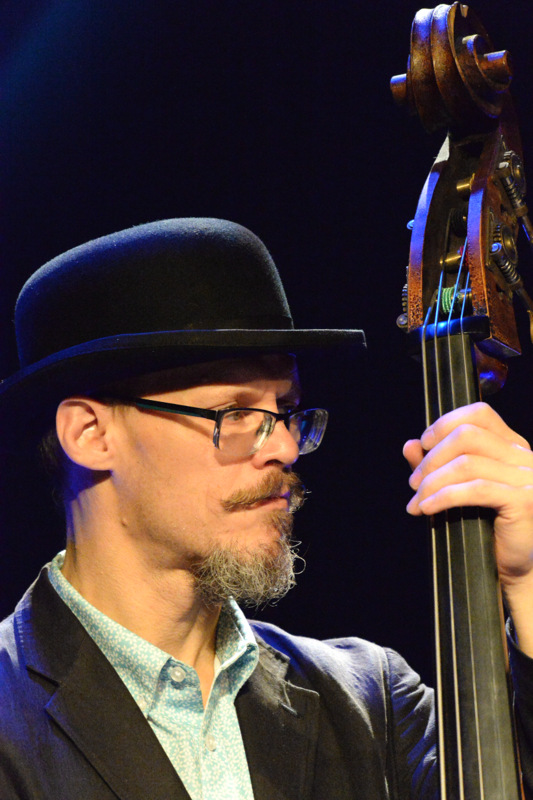Surprises are a boon to any burgeoning jazz festival. One was delivered early in Black Mountain Jazz’s week-long Wall2Wall bash at Abergavenny in the shape of singer-saxophonist Kim Cypher at a blues night gig by the John Paul Gard Trio. OK, her husband, Mike, was the trio’s drummer but it was an unexpected addition: the festival had extended its length at the start with three evenings at a new, alternative venue to the main Melville Theatre base. Organist Gard opened proceedings with the Cyphers and his fine guitarist Chris Cobbson. Singer-songwriter Lady Nade paid tribute to blues women in tunes ranging from the earthy to the wise, accompanied on electric guitar by the excellent Holly Carter. On night three, the hobo-bluegrass of Sicknote Steve’s trio reminded us of jazz’s fundamentals, demonstrating that being raw and rudimentary is as tricky as being sophisticated and modern.
Singer Ian Shaw’s gig at the festival dinner was his usual concentrated display of attributes, mixing recollection of his Welsh roots with soulful remouldings of tunes with which we might have become over-familiar. Girl From Ipanema became Boy From Ipanema (or from a place denoted by a multi-syllabic Hispanic name that chimed with the Welsh place that begins “Llanfair…” and goes on for ever). Shaw’s racy cabaret attributes were on show. Joni Mitchell’s Big Yellow Taxi was deconstructed, and there were moving performances of Life On Mars and Where Are We Now? from two gulf-separated periods in David Bowie’s life. No chart was more heart-rending than My Brother, a remembrance of the sibling who died at six months before Shaw was born.
Gustavo Firmenich’s Tango Jazz Quartet excelled at tango-jazz fusion and drew on South American music’s bounty. Firmenich (clarinet and tenor sax) and the discerning Horacio Acosta on piano led the exploration, ever reminded of its rhythmic purpose by colleagues. John Law’s Re-Creations recreated his re-creations creatively, though one wonders if jazz is not already the act of making something new and Law’s “guess the tune” element a tad fatuous. One of Satie’s Gymnopodies (easy) and Lets Face The Music And Dance (fairly easy) suggested that Law-arranged tunes are launch platforms rather than enhancements. Discuss. Billy Weir, Law’s elegant drummer, caught the ear again and was echoed later by the energised Alex Goodyear.
Appropriately slotted in here is the one inter-gig appearance in the Melville’s bar – by BMJ’s Debs Hancock for an hour-long and captivating demonstration of the quiet art of jazz singing, with guitarist Dave Hobbs. The packed audience listened, liked and applauded.
As arrangers go, Goodyear’s efforts, like his exertions at the kit, were on the nail. His Bop Septet of colleagues bound by the jazz course at the Royal Welsh College of Music & Drama explored the world of Wayne Shorter in a format inspired by Art Blakey’s Jazz Messengers. The long and integrated final medley was a triumph, and the band included that rarest of rarities, the makings of an original pianist in Michael Blanchfield. Goodyear also appeared as part of bassist Nick Kaçal’s Guerillasound concept, here manifesting itself as a quartet with electrics up front in the shape of guitarist Nicolas Meier and violinist Richard Jones. On paper it might have looked unpromising but it was a festival humdinger, essaying lamentation (a Kaçal original called Absent Not Gone) as well as some late Meier shredding and lots more. Second surprise: vocalist Sarah Meek joined the band with two beautifully laconic-ironic charts. Only trombonist Dennis Rollins could guest with Chube, the jazz-rock inspired trio led by harpist Ben Creighton-Griffiths, and cement the union, even leaping without a care into Symbiosis, one of his Velocity Trio’s most ferocious tests of nerve. With typical good grace, he deferred to his colleagues, who obliged with their own accommodating material.
The Sarah Gillespie Sextet marked the Wales launch of her new album, Wishbones, and was the festival’s first among equals on the penultimate night. She was in gutsy, lacerating form, flanked by trumpeter Nick Smart and guitarist Chris Montague. The foot-stomping, feisty singer is difficult to label. Here, one was reminded of a pluckier, more edgy Bob Dylan and the Robertson band. At one stage she good-naturedly curtailed an intro by pianist Tom Cawley for being “too jazzy”. Excuse me? Is this not a jazz festival? But these days singers who hover around the blues-contemporary folk-rockabilly tradition are herded, or get themselves herded, into the jazz fold. She was political (The Ballad Of Standing Rock), and witty in her hilarious collage of worthy emails from the nursery about her daughter (Susannah Threw A Helicopter). And lots more, in which words – she’s a skilled poet-lyricist – were as important as their jogalong instrumental settings.
The final day saw Bristol’s Renewal Choir gospelling its audience after running a workshop and, in a return to the blues venue, the warm and sophisticated singer-violinist Claire Victoria with Guy Shotton at the keyboard wound things up. She sang an extraordinary variety of material, from Bessie Smith’s Sugar In My Bowl to a partly bilingual Desafinado.
There were workshops and a film about Chet Baker. Good on you, Mike Skilton and the BMJ team.
Wall2Wall Festival, Abergavenny, 26 August – 1 September 2019
















